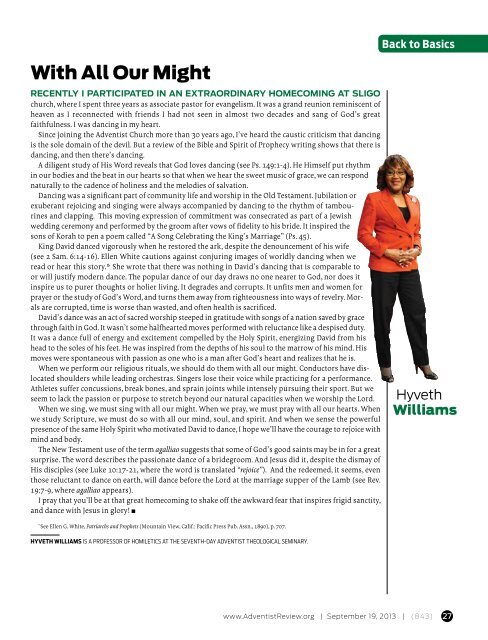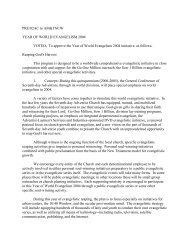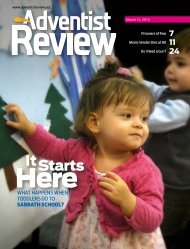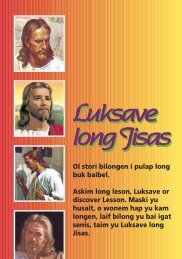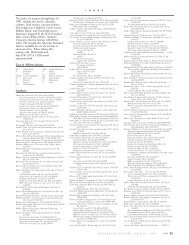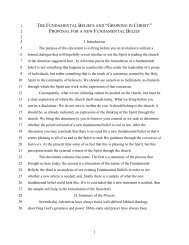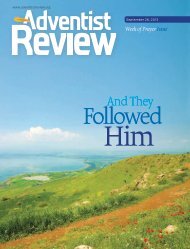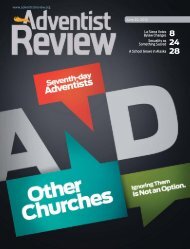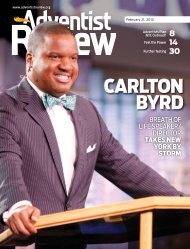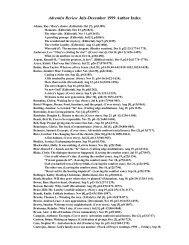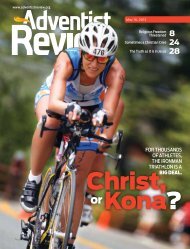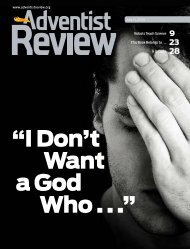Download PDF - Adventist Review
Download PDF - Adventist Review
Download PDF - Adventist Review
- No tags were found...
Create successful ePaper yourself
Turn your PDF publications into a flip-book with our unique Google optimized e-Paper software.
Back to Basics<br />
With All Our Might<br />
Recently I participated in an extraordinary homecoming at Sligo<br />
church, where I spent three years as associate pastor for evangelism. It was a grand reunion reminiscent of<br />
heaven as I reconnected with friends I had not seen in almost two decades and sang of God’s great<br />
faithfulness. I was dancing in my heart.<br />
Since joining the <strong>Adventist</strong> Church more than 30 years ago, I’ve heard the caustic criticism that dancing<br />
is the sole domain of the devil. But a review of the Bible and Spirit of Prophecy writing shows that there is<br />
dancing, and then there’s dancing.<br />
A diligent study of His Word reveals that God loves dancing (see Ps. 149:1-4). He Himself put rhythm<br />
in our bodies and the beat in our hearts so that when we hear the sweet music of grace, we can respond<br />
naturally to the cadence of holiness and the melodies of salvation.<br />
Dancing was a significant part of community life and worship in the Old Testament. Jubilation or<br />
exuberant rejoicing and singing were always accompanied by dancing to the rhythm of tambourines<br />
and clapping. This moving expression of commitment was consecrated as part of a Jewish<br />
wedding ceremony and performed by the groom after vows of fidelity to his bride. It inspired the<br />
sons of Korah to pen a poem called “A Song Celebrating the King’s Marriage” (Ps. 45).<br />
King David danced vigorously when he restored the ark, despite the denouncement of his wife<br />
(see 2 Sam. 6:14-16). Ellen White cautions against conjuring images of worldly dancing when we<br />
read or hear this story.* She wrote that there was nothing in David’s dancing that is comparable to<br />
or will justify modern dance. The popular dance of our day draws no one nearer to God, nor does it<br />
inspire us to purer thoughts or holier living. It degrades and corrupts. It unfits men and women for<br />
prayer or the study of God’s Word, and turns them away from righteousness into ways of revelry. Morals<br />
are corrupted, time is worse than wasted, and often health is sacrificed.<br />
David’s dance was an act of sacred worship steeped in gratitude with songs of a nation saved by grace<br />
through faith in God. It wasn’t some halfhearted moves performed with reluctance like a despised duty.<br />
It was a dance full of energy and excitement compelled by the Holy Spirit, energizing David from his<br />
head to the soles of his feet. He was inspired from the depths of his soul to the marrow of his mind. His<br />
moves were spontaneous with passion as one who is a man after God’s heart and realizes that he is.<br />
When we perform our religious rituals, we should do them with all our might. Conductors have dislocated<br />
shoulders while leading orchestras. Singers lose their voice while practicing for a performance.<br />
Athletes suffer concussions, break bones, and sprain joints while intensely pursuing their sport. But we<br />
seem to lack the passion or purpose to stretch beyond our natural capacities when we worship the Lord.<br />
When we sing, we must sing with all our might. When we pray, we must pray with all our hearts. When<br />
we study Scripture, we must do so with all our mind, soul, and spirit. And when we sense the powerful<br />
presence of the same Holy Spirit who motivated David to dance, I hope we’ll have the courage to rejoice with<br />
mind and body.<br />
The New Testament use of the term agalliao suggests that some of God’s good saints may be in for a great<br />
surprise. The word describes the passionate dance of a bridegroom. And Jesus did it, despite the dismay of<br />
His disciples (see Luke 10:17-21, where the word is translated “rejoice”). And the redeemed, it seems, even<br />
those reluctant to dance on earth, will dance before the Lord at the marriage supper of the Lamb (see Rev.<br />
19:7-9, where agalliao appears).<br />
I pray that you’ll be at that great homecoming to shake off the awkward fear that inspires frigid sanctity,<br />
and dance with Jesus in glory! n<br />
Hyveth<br />
Williams<br />
*<br />
See Ellen G. White, Patriarchs and Prophets (Mountain View, Calif.: Pacific Press Pub. Assn., 1890), p. 707.<br />
Hyveth Williams is a professor of homiletics at the Seventh-day <strong>Adventist</strong> Theological Seminary.<br />
www.<strong>Adventist</strong><strong>Review</strong>.org | September 19, 2013 | (843) 27


